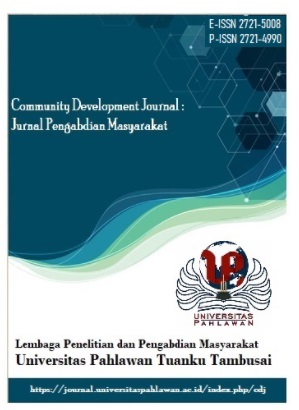MENGINTEGRASIKAN KEPEMIMPINAN, INOVASI, DAN KOMUNIKASI UNTUK MENCAPAI KESUKSESAN DI DUNIA BISNIS YANG DINAMIS: SEBUAH TINJAUAN PUSTAKA
DOI:
https://doi.org/10.31004/jrpp.v7i4.38926Keywords:
Teknologi Digital, Kepemimpinan Efektif, Komunikasi Interpersonal, Budaya Organisasi Adaptif, Kolaborasi Tim.Abstract
Penelitian ini mengeksplorasi integrasi antara kepemimpinan, inovasi, dan komunikasi sebagai elemen kunci untuk mencapai kesuksesan dalam lingkungan bisnis yang dinamis. Melalui tinjauan pustaka terhadap 10 dokumen utama, penelitian ini menyoroti bahwa kepemimpinan yang efektif tidak hanya melibatkan pengambilan keputusan strategis tetapi juga membangun budaya organisasi yang mendukung inovasi. Penelitian ini menemukan bahwa komunikasi interpersonal memainkan peran penting dalam meningkatkan kolaborasi dan memfasilitasi penerimaan ide-ide inovatif dalam tim. Selain itu, penggunaan teknologi digital diidentifikasi sebagai alat penting untuk memperluas kemampuan kepemimpinan dan mendorong inovasi di seluruh organisasi. Penelitian ini menyimpulkan bahwa budaya organisasi yang adaptif, didukung oleh kepemimpinan yang kuat dan komunikasi yang efektif, merupakan kunci dalam mempertahankan inovasi dan kesuksesan bisnis jangka panjang).References
Braun, V., & Clarke, V. (2006). Using thematic analysis in psychology. Qualitative Research in Psychology, 3(2), 77–101. https://doi.org/10.1191/1478088706qp063oa
Creswell, J. W. (2014). Research Design: Qualitative, Quantitative, and Mixed Methods Approaches (4th ed.). Sage Publications.
Day, D. V., & Dragoni, L. (2015). 7. Leadership Development: An Outcome-Oriented Review Based on Time and Levels of Analyses. Dalam Annual Review of Organizational Psychology and Organizational Behavior (Vol. 2, hlm. 133–156). Annual Reviews Inc. https://doi.org/10.1146/annurev-orgpsych-032414-111328
Drucker, P. F. (1984). 2. Innovation and entrepreneurship practice and principles. Perfect Bound.
Hargie, O. (2019). 3. The Handbook of Communication Skills (O. Hargie, Ed.; 4 ed.). Routledge.
Insights, D. (2020). Leadership in the digital age: Harnessing digital technology for effective leadership. https://www2.deloitte.com/
Kaufman, J. C., Simonton, D. K., Kaufman, A. S., Mumford, M. D., Cowles, H. W., Plucker, J., Zeidner, M., & Matthews, G. (2010). 6. Leadership 101.
Maxwell, J. C. . (2007). 8. Attitude 101?: what every leader needs to know. Thomas Nelson?; New Holland [distributor].
MTD. (2010). 4. Leadership Skills. MTD Training & Ventus Publishing ApS.
Northouse, P. G. (2021). Leadership: Theory and Practice (9th ed.). Sage Publications.
Reinders, A., & Freijsen, M. (2012). 10. Praise for The e-FacTor (E. Kelley, Ed.). BenBellaBooks,Inc.
Riggio, R. E., Murphy, S. E., & Pirozzolo, F. J. (2002). 5. Multiple Intelligences and Leadership. Lawrence Erlbaum Associates, Inc.
Schein, E. H. (2010a). 9. Organizational Culture and Leadership (Vol. 4). www.josseybass.com
Schein, E. H. (2010b). Organizational Culture and Leadership (4th ed.). Jossey-Bass.
Snyder, H. (2019). Literature review as a research methodology: An overview and guidelines. Journal of Business Research, 104, 333–339. https://doi.org/10.1016/j.jbusres.2019.07.039
Torraco, R. J. (2005). Writing integrative literature reviews: Guidelines and examples. Human Resource Development Review, 4(3), 356–367. https://doi.org/10.1177/1534484305278283
Yukl, G. (2013). Leadership in Organizations (8th ed.). Pearson.
Downloads
Published
How to Cite
Issue
Section
License
Copyright (c) 2024 Andi Muh Akbar Saputra

This work is licensed under a Creative Commons Attribution-ShareAlike 4.0 International License.






